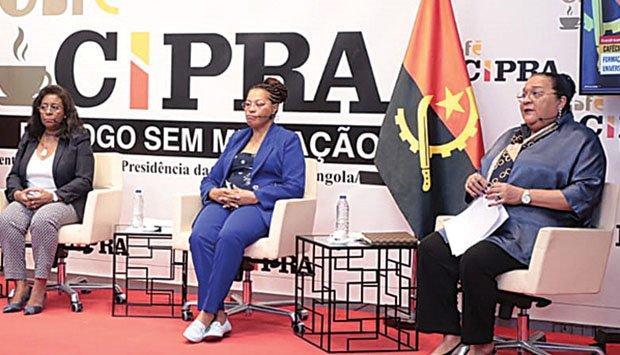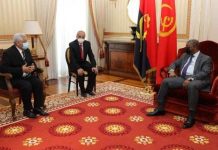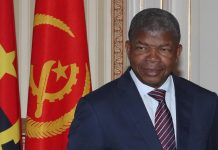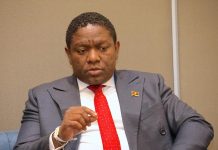Africa-Press – Angola. The director of the Staff Office of the President of the Republic, Edson Barreto, announced, Tuesday, in Luanda, that the National Human Capital Development Plan plans to accelerate, by 2037, the training of 149,100 Primary Education teachers across the country.
Edson Barreto, who was speaking during the 14th edition of Café CIPRA, addressed the Training of Human Capital in the country and in the best universities in the world, and beyond, as well as the goals and results of staff training programs.
The meeting, held at the Press Center of the Presidency of the Republic of Angola (CIPRA), served to present the Angola Human Capital 2023-2037 plan, chaired by the Vice-President of the Republic, Esperança da Costa, and coordinated by the director of the Staff Office of the President of the Republic, Edson Barreto.
During the presentation, the ministers of Higher Education, Science, Technology and Innovation, Maria do Rosário Bragança, of Public Administration, Labor and Social Security, Teresa Rodrigues, and of Education, Luísa Maria Grilo, were present.
Edson Barreto provided a framework on the policies and strategies for training staff in the country in relation to the actions of the Angola Capital Humano 2023-2037 program.
The director of the Staff Office highlighted that the program also foresees the expansion of the participation rate in Technical-Vocational Education from 10.9 percent to 15.6 percent, the expansion of the participation of the economically active population in professional training, going from 0.5 percent to 1.25 percent, and the increase in the stock of early childhood educators, going from 13,300 to 434,900.
The target also establishes an increase in the number of graduates in Public Administration, including the technical career of managers and senior technicians, from 31.9 percent to 45.1 percent, as well as foreseeing an increase in the number of entrepreneurs with basic initial training, reaching a total of 210,200 by 2037.
Edson Barreto considers that Angola has the most valuable resource a country can have, as it has a young and dynamic, resilient and entrepreneurial population. He highlighted that the demographic profile represents a challenge, but above all it is an opportunity for the development of a fair, peaceful, inclusive and more sustainable society. And to achieve this goal, education and knowledge must be a reality for all citizens, without exception.
Levels of achievement
The director of the Staff Office of the President of the Republic revealed some actions carried out, within the scope of the plan, since last year, with emphasis on the inauguration of Cinfotec, in the province of Huambo, the creation of Escola 42 and the National Qualifications Institute.
The official highlighted that the completion of these projects demonstrates the Executive’s desire to achieve the goals, although there is still a lot to be done, taking into account the execution and implementation time, which is 14 years.
Edson Barreto also mentioned, as a result, the execution of the agreement signed between the Government and the World Bank (WB), in which around 200 million dollars were made available to the Ministry of Health, for training staff in the National Health System.
Edson Barreto explained that although the plan had been approved at the end of last month, it had already been underway since 2023, with the financing having been included in the General State Budget (OGE) for the current year.
The director of the Staff Office said that the plan, approved by the Council of Ministers, is in complete articulation with the National Development Plan 2023-2027 and with the Long-Term Development Strategy Angola 2050, which establishes the vision and strategic objectives for the country on the development of human capital.
The program includes seven action plans, the first of which deals with professional technical education, under the responsibility of the Ministry of Education, the second with Professional Training, with MAPTSS, and the third and fourth with undergraduate and postgraduate training, with Ministry of Higher Education, Science, Technology and Innovation.
The fifth action of the program, according to director Edson Barreto, has to do with teacher training, in a joint effort between the ministries of Higher Education, Education and Public Administration, Labor and Social Security (MAPTSS).
While the sixth action deals with the training of Public and Municipal Administration staff, the responsibility is shared between the Ministry of Public Administration, Labor and Social Security, the Central State Administration and the Ministry of Territorial Administration.
Around one million children are left out of the education system
The Minister of Education, Luísa Grilo, announced yesterday in Luanda that annually around one million children are left out of the country’s education system, although more than 900,000 are able to access it for the first time.
The governor highlighted that even with the construction and equipping of another 15 schools annually, the situation remains.
The minister also spoke about the challenges facing the Ministry of Education, with emphasis on teacher training, pointing out the great difficulties that the country has in terms of teachers in the artistic areas, namely in Labor Education and Visual and Plastic Education (EVP).
Luísa Grilo guaranteed that the Executive is focused on training teachers in specialties of specific methodologies, which included the disciplines of Labor Education and Visual and Plastic Education.
Regarding Technical-Vocational Education, according to the head of Education, the Government intends to expand medium-technical professional training courses, with a view to diversifying the country’s economy.
“We are working with equipment that is capable of responding to demand, as well as modernizing services, offering courses and technicians necessary for the development of the economy, but to this end it is necessary to accelerate the digitalization process”, he argued.
Luísa Grilo also added that the rehabilitation and modernization of existing agricultural institutes in the country, both from a curricular and infrastructural point of view, which has the support and financing of the French Government and the European Union, is a way of encouraging youth to entrepreneurship.
University education
The Minister of Higher Education, Technology and Innovation, Maria do Rosário Bragança, discussed the staff training programs, results achieved so far and the recommended goals.
Café CIPRA is a space for dialogue between government officials and representatives of civil society, with live broadcast on Facebook, You Tube and the Government of Angola pages.
Seven thousand public servants and administrative agents trained
From 2018 to the first quarter of 2024, the National Vocational Training System trained 434,163 citizens.
The information was provided yesterday, in Luanda, by the MAPTSS minister, Teresa Rodrigues Dias, during the 14th Edition of CaféCIPRA.
According to the minister, in the same period, the National School of Public Administration (ENAPP) trained seven thousand public servants and administrative agents from various ministerial departments. 2,291 civil servants were admitted to the Public Service, through the Single Recruitment Entity (ERU).
The minister explained that it was technical factors, which involved the Ministry of Finance and MAPTSS, that made resources unfeasible to start the program, but the work is practically completed, ensuring that by next week, everything will be resolved for the start of the program. project.
In the field of Staff Training, the minister highlighted the National School of Administration and Public Policies (ENAPP) as an important training center, including regional ones.
The minister informed that ENAPP has senior leadership courses, carried out in alignment with the Agostinho Neto University.
The National Institute of Employment and Professional Training (INEFOP), revealed, has 162 professional training centers, from levels I, II, II and IV, some of which are taught at Cinfotec, depending on cutting-edge technologies. In Luanda, for example, he said that there are Cinfotec in Talatona and Rangel, which satisfy the needs of the market, with courses in industrial metalwork, welding and others.
The minister said that professional internships, through INEFOP, have been paid, and almost all interns end up being absorbed into these companies. She highlighted that the Employment Service Centers are in certain areas of the country and host training offers, in addition to job searches.
For More News And Analysis About Angola Follow Africa-Press






